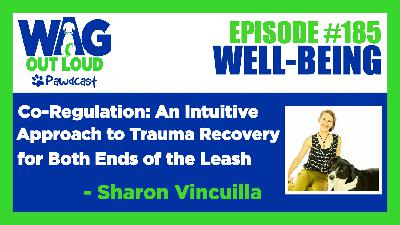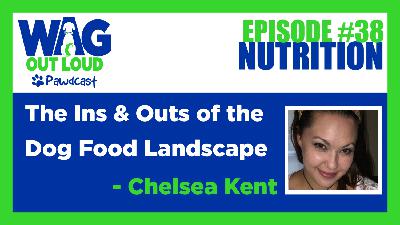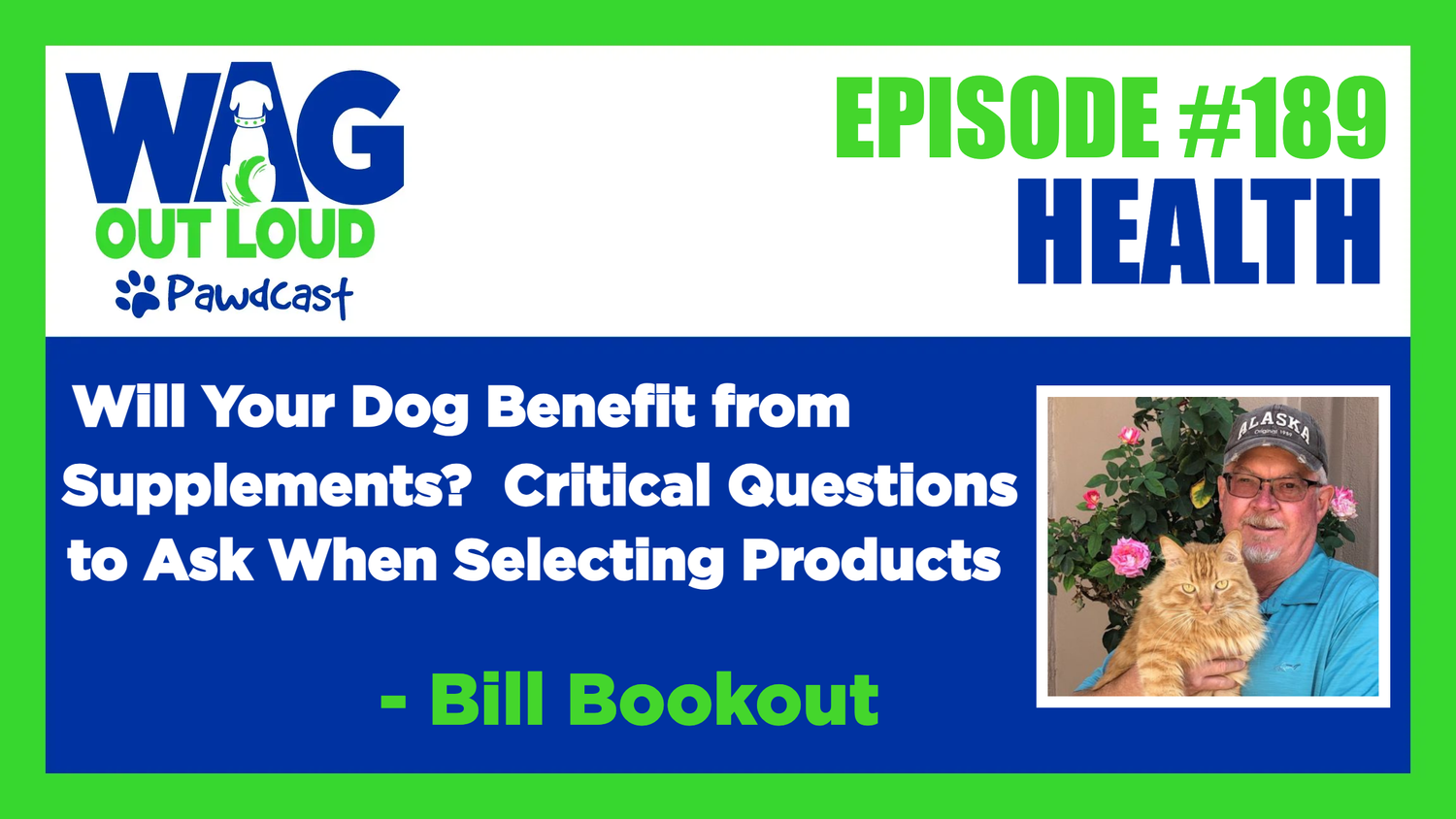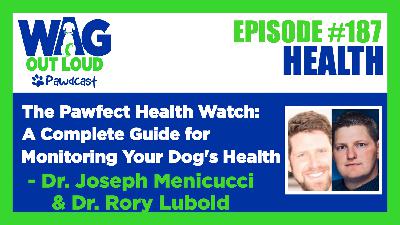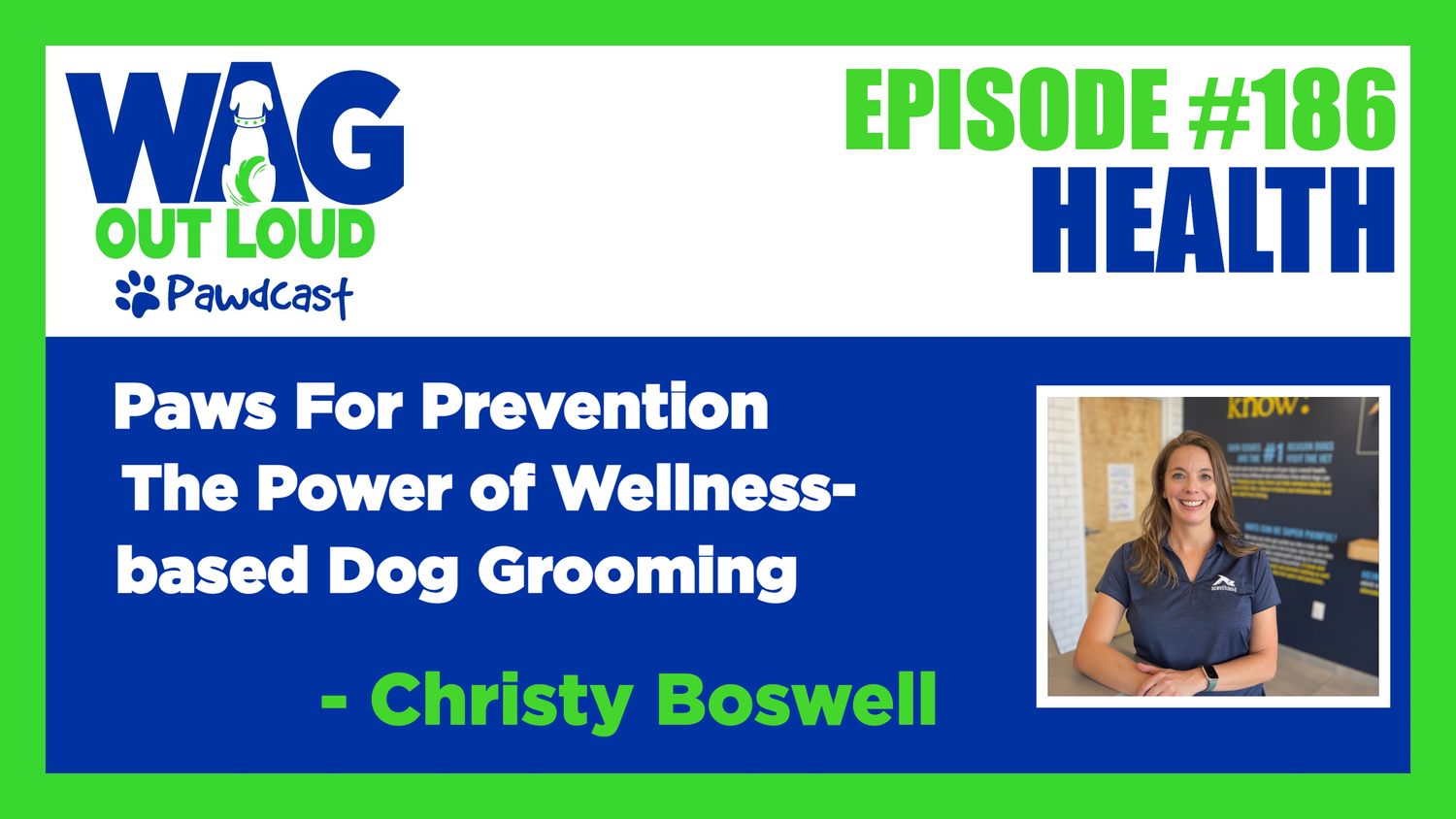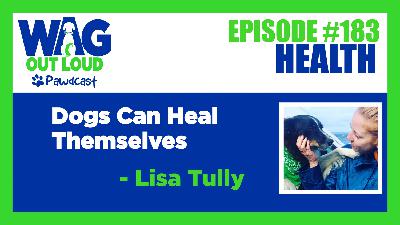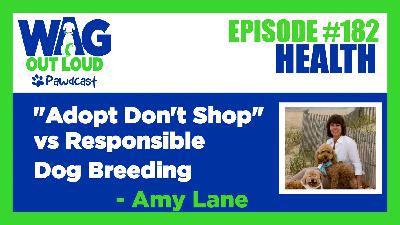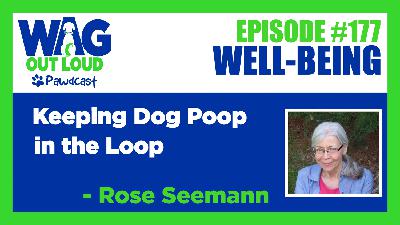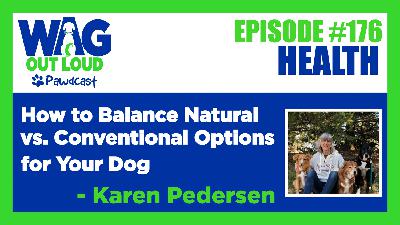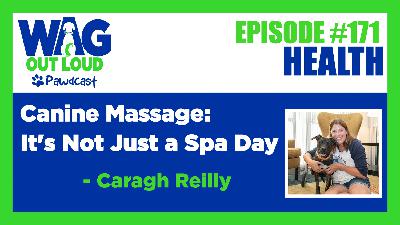Co-Regulation: An Intuitive Approach to Trauma Recovery for Both Ends of the Leash
Update: 2023-10-04
Description
Hello! This is Krista with Episode #185 on the Wag Out Loud pawdcast. Have you checked out all of the amazing trusted brands that I highly recommend? These are products that I've researched and tried that I know, like, and trust. Also products that will help your dog to thrive. So just go to WagOutLoud.com And check out the trusted brands section. And I've negotiated discounts for most of the products, so why not see what can make a difference in your dog's life? And don't forget to also check out the resources page as well. It's filled with some very important info for both you and your dog.
Many people think that with their dogs, tummy troubles, that itchy skin or infected ears are all a result of a food allergy. But true food allergies are really pretty rare, only affecting about 1- 3% of dogs. So most likely your dog's issues have developed over time and would be considered a result of a food intolerance. The main culprits of food allergies and intolerances are wheat, chicken, beef, and dairy, as well as additives and chemicals that are commonly found in highly processed dog food.
Welcome to the Wag Out Loud pawdcast, where we are obsessed with bringing you helpful tips on canine health care, nutrition, and overall wellbeing. If you'd like to support the show, check out the amazing online events, products and resources that I personally recommend on the Wag Out Loud website. I'm your host, Krista and I'm super excited to be bringing you yet another tail wagging episode.
Sharon Vincuilla is an occupational therapist who did her doctoral residency in the Los Angeles community-based mental health system. She developed group and individual programs for adults living with serious mental illness to support nervous system regulation, executive function, and participation in daily activities. Sharon also has over 15 years experience as a dog trainer and behavior consultant, specializing in rescue rehab, anxiety, and aggression. Sharon has come to recognize that beneath the struggles of both dogs with behavior problems and adults with mental illness lie trauma, sensory hypersensitivity, and nervous system dysregulation. So, she started Human Canine Collaborative to offer virtual coaching and classes to teach humans how to support themselves AND their dogs through trauma recovery, reactive behavior modification, and stressful circumstances by learning how to co-regulate with each other.
Hi there dog lovers, how lucky are we to learn from today's guest, Sharon Vincuilla, and she is going to cover co-regulation; an intuitive approach to trauma recovery for both ends of the leash. So Sharon, welcome to the show.
Thank you so much, Krista. I'm really delighted to be here today,
I can't wait to learn from you. So before we get started, I'm going to ask you to introduce yourself. And just give us a little more about your amazing background and why you started the Human Canine Collaborative.
Sharon’s Background and Findings
Yeah, thanks for that prompt. My name is Sharon and my pronouns are she/her. And I'm a Doctor of Occupational Therapy and a Canine Behavior Consultant. I began my career in dog training, working as a dog trainer at a kennel facility doing boarding and training and group classes and private sessions. And at the same time, I was volunteering with my own dogs, taking them to visit nursing homes and children's courts and schools. And it was through that volunteer work that I got introduced to occupational therapy. And I decided to go back to school because I wanted to do animal assisted therapy, full time. And while I was doing OT, I specialized my training in community based mental health, as many mental health providers do, I was searching for more understanding of myself, and also wanting to be able to better support people who are struggling with various mental health conditions, who also live with dogs. And I noticed it through that work that there were a lot of people who found a lot of support from their dogs. And there were a lot of people who were struggling to be able to live with dogs because of their symptoms. And I also noticed this parallel between the symptoms that my clients were experiencing, my human clients who had experienced trauma, and the dogs who I'd worked with who were behaving with reactivity and aggression and anxiety. And I noticed that same parallel in myself in my own struggles with mental health and anxiety. And I realized that the common denominator for all of us is nervous system regulation. When we can't regulate our nervous systems, we have a hard time doing the things that we need and want to do every day.
Well, you're in the perfect spot with your background and doing this and I think every listener here today is going to learn something for themselves. You don't have to be suffering from some major trauma to get something out of this, right?
That's absolutely right. Every human has a nervous system and all of us will benefit from learning about our nervous systems and understanding what our bodies are trying to tell us.
Right. And I hate to say it, but our nervous systems never switch off. Well Sharon the cool thing is, I think we all know by now that there's tons of studies out there that have demonstrated the calming and distressing effect that our dogs do have on us. So I love that we're going to dig a little deeper on the relationship that we have with our dogs and how they can help us. So let's talk about trauma. How do you define trauma specifically, when it comes to talking about our trauma, as well as our dog's?
Trauma
Trauma, I look at trauma as any stressful situation that is beyond one's ability to cope. And so I really like that definition, because it highlights how subjective trauma is, right? So what's traumatic for me is not necessarily going to be traumatic for you.
That makes total sense. And people love to hear stories and examples. So what are some examples of some different types of trauma that we experience?
Trauma Example
Well, I'll get I'll be real specific and tell you about my own experience. Sure. So my experiences that have been traumatic, have involved all kinds of things. I mean, I can remember being very young, and being on the school bus. And there were some boys behind me that were teasing me. And they were poking me. And I, and they were saying something like, Hey, little girl. And I was like, at a new school. So this was all like, everything was kind of overwhelming to me. And I was very sensitive, in my touch system. And in my sound system. So like hearing things and feeling things on my skin could feel very overwhelming. And so having having these kids behind me, saying things that sounded like taunting, and then poking me unexpectedly, that was a really traumatic situation. And I didn't have the skills to be able to cope with that. And so that has stayed with me, throughout my life.
That's a great example. And I can just think, I mean, for both us and our dogs, major life events, like, you know, natural disasters, a move, a divorce, being attacked. You know, I think of all of these that could have a lasting effect on our lives.
Traumatic Situations
Yeah, yeah, there are so many situations that result from the environment, from weather, but also situations that arise in relationships with other people that can have a have an impact on us, because we because of the fear that's involved, and the threat to our lives, or our survival. But also, because of that, going back to that idea of like, we don't have the skills to cope, or when we don't have the skills to cope. That is when our nervous systems really can overreact and change permanently, in order to try to improve the coping ability. Should there be a next time?
Well said, that makes it easy to understand. So let's go back to the title of this episode, you're going to talk about Co-regulation. What does that mean, in relation to our central nervous systems?
What is Co-Regulation?
So I'm gonna define self regulation first. Yep. So self regulation is shifting your nervous system from one state to another. And we have three states. So one state, and each state is kind of like a setting that the nervous system goes into where there are different combinations of organs that are turned on, so that we can do different things. So one setting is called immobilize. That's our rest and digest setting. And then we also have a mobilized setting, that's our exercise, play and fight or flight setting. And then we have a social connected setting. And that's where we have all of our listening abilities turned on and our ability to talk to others. And the part of our brain that is engaged with teaching and learning is also turned on in that setting.
Okay, so that's self regulation.
Yeah, exactly. So co-regulation is when you shift the nervous system from one state to another, with another. So with humans, human parents co regulate with their infants all the time, the baby cries and then you go and pick them up and swaddle them, or rock them or coo at them. And that helps them to calm their body and shift into a calmer state. And they can't do it. By themselves. They don't have the ability to. And we can also co regulate with any other living beings. So we can co regulate with dogs. Also, we can co regulate in terms of doing an activity with our dogs that supports our nervous system, and theirs in shifting to another state.
That's the good stuff right there.
Absolutely.
Well, Sharon, I know that you have had a journey with your own dog Muggins. And I know you shared the story with me. I would love for you to talk about that again now with our listeners.
Sharon’s Journey with Muggins
Yeah, thanks for asking about that again. So I adopted Muggins. I also use they/them pronouns with logins, just to give myself some practicing with using those pronouns. So I adopted Muggins when they were three and a half months old, from the shelter. And they were having a hard
Many people think that with their dogs, tummy troubles, that itchy skin or infected ears are all a result of a food allergy. But true food allergies are really pretty rare, only affecting about 1- 3% of dogs. So most likely your dog's issues have developed over time and would be considered a result of a food intolerance. The main culprits of food allergies and intolerances are wheat, chicken, beef, and dairy, as well as additives and chemicals that are commonly found in highly processed dog food.
Welcome to the Wag Out Loud pawdcast, where we are obsessed with bringing you helpful tips on canine health care, nutrition, and overall wellbeing. If you'd like to support the show, check out the amazing online events, products and resources that I personally recommend on the Wag Out Loud website. I'm your host, Krista and I'm super excited to be bringing you yet another tail wagging episode.
Sharon Vincuilla is an occupational therapist who did her doctoral residency in the Los Angeles community-based mental health system. She developed group and individual programs for adults living with serious mental illness to support nervous system regulation, executive function, and participation in daily activities. Sharon also has over 15 years experience as a dog trainer and behavior consultant, specializing in rescue rehab, anxiety, and aggression. Sharon has come to recognize that beneath the struggles of both dogs with behavior problems and adults with mental illness lie trauma, sensory hypersensitivity, and nervous system dysregulation. So, she started Human Canine Collaborative to offer virtual coaching and classes to teach humans how to support themselves AND their dogs through trauma recovery, reactive behavior modification, and stressful circumstances by learning how to co-regulate with each other.
Hi there dog lovers, how lucky are we to learn from today's guest, Sharon Vincuilla, and she is going to cover co-regulation; an intuitive approach to trauma recovery for both ends of the leash. So Sharon, welcome to the show.
Thank you so much, Krista. I'm really delighted to be here today,
I can't wait to learn from you. So before we get started, I'm going to ask you to introduce yourself. And just give us a little more about your amazing background and why you started the Human Canine Collaborative.
Sharon’s Background and Findings
Yeah, thanks for that prompt. My name is Sharon and my pronouns are she/her. And I'm a Doctor of Occupational Therapy and a Canine Behavior Consultant. I began my career in dog training, working as a dog trainer at a kennel facility doing boarding and training and group classes and private sessions. And at the same time, I was volunteering with my own dogs, taking them to visit nursing homes and children's courts and schools. And it was through that volunteer work that I got introduced to occupational therapy. And I decided to go back to school because I wanted to do animal assisted therapy, full time. And while I was doing OT, I specialized my training in community based mental health, as many mental health providers do, I was searching for more understanding of myself, and also wanting to be able to better support people who are struggling with various mental health conditions, who also live with dogs. And I noticed it through that work that there were a lot of people who found a lot of support from their dogs. And there were a lot of people who were struggling to be able to live with dogs because of their symptoms. And I also noticed this parallel between the symptoms that my clients were experiencing, my human clients who had experienced trauma, and the dogs who I'd worked with who were behaving with reactivity and aggression and anxiety. And I noticed that same parallel in myself in my own struggles with mental health and anxiety. And I realized that the common denominator for all of us is nervous system regulation. When we can't regulate our nervous systems, we have a hard time doing the things that we need and want to do every day.
Well, you're in the perfect spot with your background and doing this and I think every listener here today is going to learn something for themselves. You don't have to be suffering from some major trauma to get something out of this, right?
That's absolutely right. Every human has a nervous system and all of us will benefit from learning about our nervous systems and understanding what our bodies are trying to tell us.
Right. And I hate to say it, but our nervous systems never switch off. Well Sharon the cool thing is, I think we all know by now that there's tons of studies out there that have demonstrated the calming and distressing effect that our dogs do have on us. So I love that we're going to dig a little deeper on the relationship that we have with our dogs and how they can help us. So let's talk about trauma. How do you define trauma specifically, when it comes to talking about our trauma, as well as our dog's?
Trauma
Trauma, I look at trauma as any stressful situation that is beyond one's ability to cope. And so I really like that definition, because it highlights how subjective trauma is, right? So what's traumatic for me is not necessarily going to be traumatic for you.
That makes total sense. And people love to hear stories and examples. So what are some examples of some different types of trauma that we experience?
Trauma Example
Well, I'll get I'll be real specific and tell you about my own experience. Sure. So my experiences that have been traumatic, have involved all kinds of things. I mean, I can remember being very young, and being on the school bus. And there were some boys behind me that were teasing me. And they were poking me. And I, and they were saying something like, Hey, little girl. And I was like, at a new school. So this was all like, everything was kind of overwhelming to me. And I was very sensitive, in my touch system. And in my sound system. So like hearing things and feeling things on my skin could feel very overwhelming. And so having having these kids behind me, saying things that sounded like taunting, and then poking me unexpectedly, that was a really traumatic situation. And I didn't have the skills to be able to cope with that. And so that has stayed with me, throughout my life.
That's a great example. And I can just think, I mean, for both us and our dogs, major life events, like, you know, natural disasters, a move, a divorce, being attacked. You know, I think of all of these that could have a lasting effect on our lives.
Traumatic Situations
Yeah, yeah, there are so many situations that result from the environment, from weather, but also situations that arise in relationships with other people that can have a have an impact on us, because we because of the fear that's involved, and the threat to our lives, or our survival. But also, because of that, going back to that idea of like, we don't have the skills to cope, or when we don't have the skills to cope. That is when our nervous systems really can overreact and change permanently, in order to try to improve the coping ability. Should there be a next time?
Well said, that makes it easy to understand. So let's go back to the title of this episode, you're going to talk about Co-regulation. What does that mean, in relation to our central nervous systems?
What is Co-Regulation?
So I'm gonna define self regulation first. Yep. So self regulation is shifting your nervous system from one state to another. And we have three states. So one state, and each state is kind of like a setting that the nervous system goes into where there are different combinations of organs that are turned on, so that we can do different things. So one setting is called immobilize. That's our rest and digest setting. And then we also have a mobilized setting, that's our exercise, play and fight or flight setting. And then we have a social connected setting. And that's where we have all of our listening abilities turned on and our ability to talk to others. And the part of our brain that is engaged with teaching and learning is also turned on in that setting.
Okay, so that's self regulation.
Yeah, exactly. So co-regulation is when you shift the nervous system from one state to another, with another. So with humans, human parents co regulate with their infants all the time, the baby cries and then you go and pick them up and swaddle them, or rock them or coo at them. And that helps them to calm their body and shift into a calmer state. And they can't do it. By themselves. They don't have the ability to. And we can also co regulate with any other living beings. So we can co regulate with dogs. Also, we can co regulate in terms of doing an activity with our dogs that supports our nervous system, and theirs in shifting to another state.
That's the good stuff right there.
Absolutely.
Well, Sharon, I know that you have had a journey with your own dog Muggins. And I know you shared the story with me. I would love for you to talk about that again now with our listeners.
Sharon’s Journey with Muggins
Yeah, thanks for asking about that again. So I adopted Muggins. I also use they/them pronouns with logins, just to give myself some practicing with using those pronouns. So I adopted Muggins when they were three and a half months old, from the shelter. And they were having a hard
Comments
In Channel

